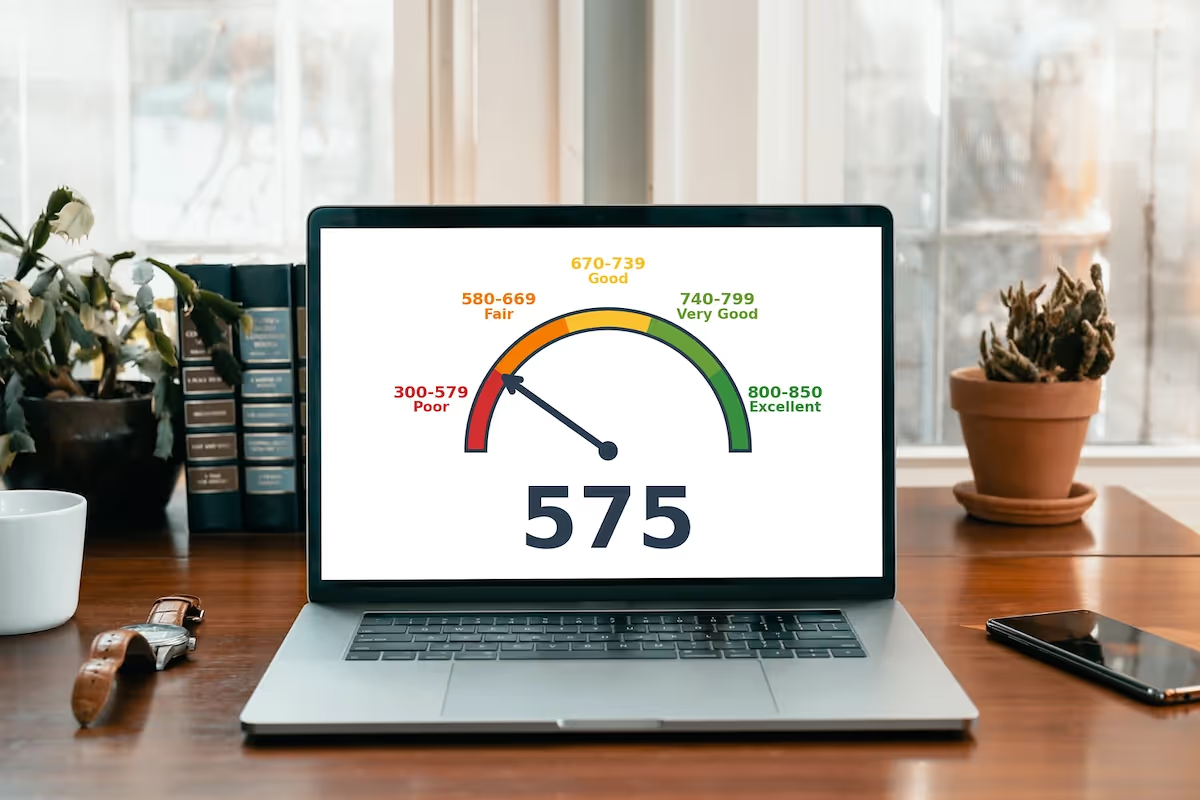
Kudos has partnered with CardRatings and Red Ventures for our coverage of credit card products. Kudos, CardRatings, and Red Ventures may receive a commission from card issuers. Kudos may receive commission from card issuers. Some of the card offers that appear on Kudos are from advertisers and may impact how and where card products appear on the site. Kudos tries to include as many card companies and offers as we are aware of, including offers from issuers that don't pay us, but we may not cover all card companies or all available card offers. You don't have to use our links, but we're grateful when you do!
575 Credit score: What You Need to Know in 2025
July 1, 2025


TL;DR
While a 575 credit score presents some challenges, it's a valuable starting point for establishing a stronger financial future. This score falls into the 'Poor' FICO category, which signals a clear path forward for credit improvement.
What Does a 575 Credit Score Mean?
A 575 credit score falls into the "poor" range on the FICO scale, which spans from 300 to 850. Lenders generally view scores below 580 as a sign of high risk, indicating a history of credit missteps. This can make financial institutions hesitant to extend new credit, as it suggests you may have difficulty managing debt responsibly.
Consequently, a score in this range can significantly impact your financial life. You may face rejections for loans and credit cards or be offered unfavorable terms with high interest rates, making borrowing more costly. While it presents challenges, this score is not a permanent label but rather a starting point for building a healthier financial future.
Who Has a 575 Credit Score?
While age itself isn't a factor in calculating your credit score, there is a strong correlation between age and creditworthiness. Older consumers tend to have higher scores because they've had more time to build a positive payment history. According to 2023 Experian data, here is the average FICO score for each generation:
- Generation Z (ages 18-26): 680
- Millennials (ages 27-42): 690
- Generation X (ages 43-58): 709
- Baby Boomers (ages 59-77): 745
- Silent Generation (ages 78+): 760
Credit Cards With a 575 Credit Score
A credit score of 575 falls into the "poor" credit range, which can significantly impact your ability to qualify for a traditional credit card. Many mainstream lenders view this score as high-risk, meaning you'll likely face rejections for most unsecured cards that offer premium rewards and low interest rates. While obtaining a card isn't impossible, your options will generally be limited to secured cards or unsecured cards specifically designed for building credit, which often come with higher fees and lower credit limits.
To find a card that fits your financial situation, Kudos offers a free AI-powered Explore Tool that uses a quiz to understand your preferences, such as minimizing fees or building credit. The platform provides personalized recommendations from a database of nearly 3,000 cards, allowing you to compare options and make an informed decision.
Auto Loans and a 575 Credit Score
A credit score of 575 places you in the subprime category, which lenders view as a higher risk. Consequently, you can expect to face significantly higher interest rates and may find it more challenging to secure loan approval compared to borrowers with better credit.
According to a 2025 market analysis, here is how average rates break down by credit score tier:
- Super-prime (781-850): 5.25% for new cars and 7.13% for used cars
- Prime (661-780): 6.87% for new cars and 9.36% for used cars
- Non-prime (601-660): 9.83% for new cars and 13.92% for used cars
- Subprime (501-600): 13.18% for new cars and 18.86% for used cars
- Deep subprime (300-500): 15.77% for new cars and 21.55% for used cars
Mortgages at a 575 Credit Score
With a 575 credit score, your options are limited but not nonexistent. Conventional loans are generally out of reach, but you may still qualify for an FHA loan. Because your score is below the 580 threshold for a minimal down payment, you will be required to provide at least 10% down. Some specialty lenders might also offer non-prime mortgages, but these typically come with stricter terms.
A 575 score will also lead to less favorable loan terms. You can expect a higher interest rate and additional FHA mortgage insurance fees, increasing your monthly payment. Lenders may also cap your borrowing amount and will likely subject your finances to a more rigorous review process called manual underwriting to offset their risk.
What's in a Credit Score?
Figuring out what goes into your credit score can feel like trying to solve a complex puzzle, but it's primarily based on a handful of key financial habits. The most common factors include:
- Your payment history tracks whether you have paid past credit accounts on time.
- Credit utilization is the percentage of your available credit that you are currently using.
- The length of your credit history considers the age of your oldest account and the average age of all your accounts.
- Having a healthy mix of credit types, such as credit cards and installment loans, can positively impact your score.
- Recent credit inquiries and newly opened accounts can temporarily lower your score.
How to Improve Your 575 Credit Score
Don't be discouraged by a 575 credit score; improving it is an achievable goal with consistent, positive financial habits. With the right strategies, most people can see meaningful changes within three to six months.
- Monitor your credit reports. Regularly checking your reports from all three bureaus helps you spot and dispute inaccuracies that could be unfairly lowering your score. This also allows you to track your progress and ensure your positive actions are being recorded correctly.
- Set up automatic bill payments. Since payment history is the single most important factor in your credit score, ensuring every bill is paid on time is crucial. Automating payments prevents missed due dates, which directly addresses a common reason for low scores.
- Lower your credit utilization. High balances hurt your score, so aim to use less than 30% of your available credit. Paying down debt improves this ratio, showing lenders you can manage credit responsibly and boosting the second-most influential part of your score.
- Apply for a secured credit card. For those with poor credit, a secured card is an excellent tool for rebuilding a positive payment history. Because it requires a security deposit, it's easier to get approved for, and your responsible use is reported to the credit bureaus.
To help you make smarter decisions while rebuilding your credit, consider using a tool like Kudos to maximize rewards and find the right cards for your financial journey.
Unlock your extra benefits when you become a Kudos member

Turn your online shopping into even more rewards

Join over 400,000 members simplifying their finances

Editorial Disclosure: Opinions expressed here are those of Kudos alone, not those of any bank, credit card issuer, hotel, airline, or other entity. This content has not been reviewed, approved or otherwise endorsed by any of the entities included within the post.



































.webp)



.webp)



.webp)

